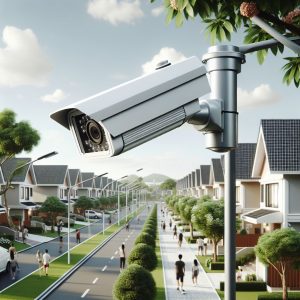Introduction
IP CCTV (Internet Protocol Closed-Circuit Television) systems have revolutionized the way we approach security and surveillance. Unlike traditional analog systems, IP CCTV systems use digital technology to transmit and store video data over a network. This article aims to answer some of the most frequently asked questions about IP CCTV systems, helping you understand their benefits, components, and functionality.
1. What is an IP Camera?
An IP camera, or Internet Protocol camera, is a type of digital video camera that transmits data over a network. Unlike analog cameras, which send video signals to a digital video recorder (DVR) via coaxial cables, IP cameras send and receive data through the internet or a local network. This allows for higher resolution video, remote access, and more advanced features.
2. How Do IP Cameras Work?
IP cameras capture video footage and convert it into digital data. This data is then transmitted over a network to a Network Video Recorder (NVR) or a cloud-based storage system. The NVR stores and manages the video data, allowing users to view live feeds or playback recorded footage. IP cameras can be connected to the network using Ethernet cables or wirelessly.
3. What Are the Key Components of an IP CCTV System?
An IP CCTV system typically includes the following components:
- IP Cameras: Capture and transmit video data.
- Network Video Recorder (NVR): Stores and manages video data.
- Network Cabling: Connects cameras to the network.
- PoE Switch: Provides power and network connectivity to cameras.
- Viewing Devices: Computers, smartphones, or tablets used to access live or recorded footage.
4. What Are the Advantages of IP Cameras Over Analog Cameras?
IP cameras offer several advantages over traditional analog cameras:
- Higher Resolution: IP cameras provide better image quality and higher resolution.
- Remote Access: Users can access live or recorded footage from anywhere with an internet connection.
- Scalability: IP systems are easier to expand with additional cameras.
- Advanced Features: IP cameras often include features like motion detection, facial recognition, and video analytics.
5. How Do I Choose the Right IP Camera for My Needs?
When selecting an IP camera, consider the following factors:
- Resolution: Higher resolution cameras provide clearer images.
- Field of View: Choose a camera with an appropriate field of view for your surveillance area.
- Lighting Conditions: Ensure the camera can handle varying lighting conditions, such as low light or bright sunlight.
- Indoor vs. Outdoor: Select a camera designed for the environment where it will be installed.
- Additional Features: Consider features like night vision, motion detection, and audio capabilities.
6. How Do I Install an IP CCTV System?
Installing an IP CCTV system involves the following steps:
- Plan Your System: Determine the number and placement of cameras.
- Run Network Cabling: Install Ethernet cables to connect cameras to the network.
- Mount Cameras: Secure cameras in their designated locations.
- Connect to NVR: Connect cameras to the NVR or network switch.
- Configure Settings: Set up camera settings, such as resolution and recording schedules.
- Test the System: Ensure all cameras are functioning correctly and adjust settings as needed.
7. What is PoE and How Does It Benefit IP CCTV Systems?
PoE (Power over Ethernet) is a technology that allows network cables to carry electrical power. This means that a single Ethernet cable can provide both data and power to an IP camera, simplifying installation and reducing the need for additional power sources.
8. How Secure Are IP CCTV Systems?
IP CCTV systems offer robust security features, including:
- Data Encryption: Ensures that video data is securely transmitted over the network.
- User Authentication: Requires users to log in with credentials to access the system.
- Firmware Updates: Regular updates help protect against vulnerabilities.
- Network Security: Implementing firewalls and VPNs can further enhance security.
9. Can IP Cameras Work in Low Light Conditions?
Yes, many IP cameras are equipped with low-light technology, such as infrared (IR) LEDs or Wide Dynamic Range (WDR), to capture clear images in low light or varying lighting conditions. These features ensure that the camera can provide usable footage even in challenging environments.
10. What is the Difference Between NVR and DVR?
The main difference between NVR (Network Video Recorder) and DVR (Digital Video Recorder) lies in how they process video data:
- NVR: Used with IP cameras, processes and stores digital video data transmitted over a network.
- DVR: Used with analog cameras, processes and stores analog video data converted to digital format.
Conclusion
IP CCTV systems offer a modern, flexible, and scalable solution for security and surveillance needs. With higher resolution, remote access, and advanced features, they provide significant advantages over traditional analog systems. By understanding the key components, installation process, and benefits, you can make an informed decision about implementing an IP CCTV system for your home or business.
Secure Your Home and Business with Garrison Alarms!
Experience unmatched safety with Garrison Alarms – your trusted partner in cutting-edge home and business security solutions. With over 35 years of experience, we offer expert installation, state-of-the-art technology, and personalized security strategies tailored to your unique needs.
Our Services Include:
- Home & Business Alarms: Maximize security with our advanced wired and wireless alarm systems.
- CCTV Systems: Protect your property with high-resolution, 4K HD, and color night vision cameras.
- Access Control: Secure your premises with keypad entry, biometric solutions, and more.
- Alarm Monitoring: 24/7 monitoring to ensure your safety and peace of mind.
Why Choose Garrison Alarms?
- Expert & Professional Service: Our licensed technicians provide top-notch installation and support.
- Customer Satisfaction: We prioritize your security and satisfaction with a focus on quality and reliability.
- Affordable Pricing: Get the best security solutions at competitive prices.
Get a FREE Quote Today! Visit Garrison Alarms or call us at 09 520 4875 to learn more and secure your property today!
Garrison Alarms – Your Safety, Our Priority





